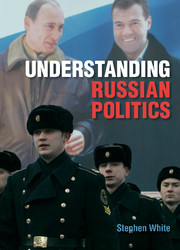Book contents
- Frontmatter
- Contents
- List of figures
- List of tables
- Preface
- Map: administrative units under the 1993 Constitution
- 1 From communist to postcommunist rule
- 2 Voters, parties and parliament
- 3 Presidential government
- 4 From plan to market
- 5 A divided society
- 6 Changing times, changing values
- 7 Russia and the wider world
- 8 What kind of system?
- Notes
- A Note on surveys
- Index
- References
7 - Russia and the wider world
Published online by Cambridge University Press: 05 June 2012
- Frontmatter
- Contents
- List of figures
- List of tables
- Preface
- Map: administrative units under the 1993 Constitution
- 1 From communist to postcommunist rule
- 2 Voters, parties and parliament
- 3 Presidential government
- 4 From plan to market
- 5 A divided society
- 6 Changing times, changing values
- 7 Russia and the wider world
- 8 What kind of system?
- Notes
- A Note on surveys
- Index
- References
Summary
The USSR had repudiated the capitalist system, but it became closely engaged in the affairs of the international community and occupied an important position as a member of the United Nations Security Council quite apart from its great size and military might. There was a closer association with the ‘other democracies’ during the Yeltsin presidency, but it became increasingly clear that a change of government did not necessarily mean that more enduring sources of division had been eliminated. In the Putin and Medvedev years, in part as a reaction, there was a stronger emphasis on relations with the other post-Soviet republics, and with Asia. There was also a greater willingness to assert Russia's distinctive interests, for instance in the face of ‘coloured revolutions’ elsewhere in post-Soviet space. But in what way? Discussions among Russian politicians and commentators in the Putin–Medvedev years suggested at least three different answers: a ‘liberal Westernising’ strategy, a ‘fundamentalist nationalist’ alternative and a ‘pragmatic nationalist’ position that appeared to be close to the position of the governing authorities themselves.
For a country of its size and population, the Soviet Union had always been rather isolated from the rest of the international community. In part, at least, this reflected the influence of geography. With their broad and open frontiers, its Russian core territories had been invaded and occupied many times by outside powers.
- Type
- Chapter
- Information
- Understanding Russian Politics , pp. 263 - 320Publisher: Cambridge University PressPrint publication year: 2011



